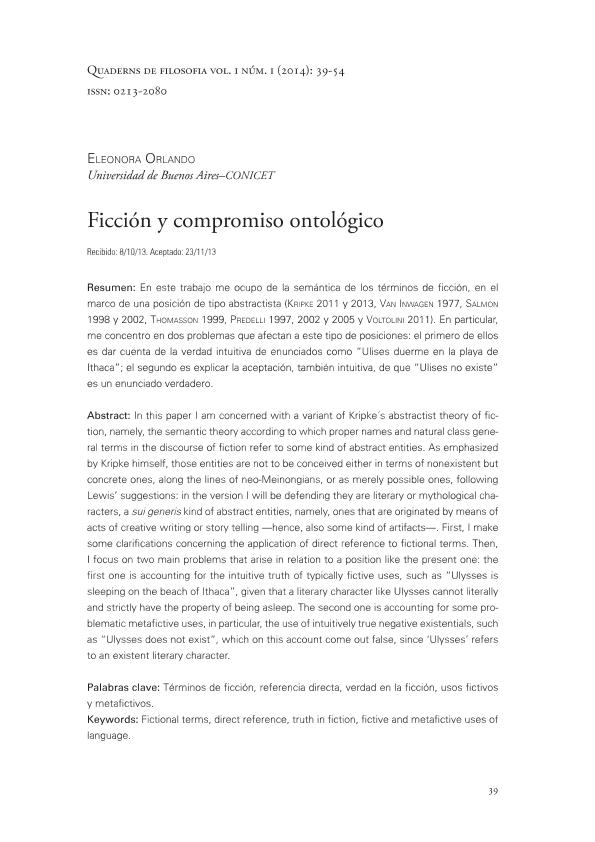Mostrar el registro sencillo del ítem
dc.contributor.author
Orlando, Eleonora Eva

dc.date.available
2018-01-24T19:28:16Z
dc.date.issued
2014-02
dc.identifier.citation
Orlando, Eleonora Eva; Ficción y compromiso ontológico; Universitat de València. Facultat de Filosofia i Ciències de l'Educació. Departament de Filosofia; Quaderns de Filosofia; 1; 1; 2-2014; 39-54
dc.identifier.issn
2341-1414
dc.identifier.uri
http://hdl.handle.net/11336/34457
dc.description.abstract
En este trabajo me ocupo de la semántica de los términos de ficción, en el marco de una posición de tipo abstractista (KRIPKE 2011 y 2013, VAN INWAGEN 1977, SALMON 1998 y 2002, THOMASSON 1999, PREDELLI 1997, 2002 y 2005 y VOLTOLINI 2011). En particular, me concentro en dos problemas que afectan a este tipo de posiciones: el primero de ellos es dar cuenta de la verdad intuitiva de enunciados como "Ulises duerme en la playa de Ithaca"; el segundo es explicar la aceptación, también intuitiva, de que "Ulises no existe" es un enunciado verdadero.
dc.description.abstract
In this paper I am concerned with a variant of Kripke´s abstractist theory of fiction, namely, the semantic theory according to which proper names and natural class general terms in the discourse of fiction refer to some kind of abstract entities. As emphasized by Kripke himself, those entities are not to be conceived either in terms of nonexistent but concrete ones, along the lines of neo-Meinongians, or as merely possible ones, following Lewis’ suggestions: in the version I will be defending they are literary or mythological characters, a sui generis kind of abstract entities, namely, ones that are originated by means of acts of creative writing or story telling —hence, also some kind of artifacts—. First, I make some clarifications concerning the application of direct reference to fictional terms. Then, I focus on two main problems that arise in relation to a position like the present one: the first one is accounting for the intuitive truth of typically fictive uses, such as “Ulysses is sleeping on the beach of Ithaca”, given that a literary character like Ulysses cannot literally and strictly have the property of being asleep. The second one is accounting for some problematic metafictive uses, in particular, the use of intuitively true negative existentials, such as “Ulysses does not exist”, which on this account come out false, since ‘Ulysses’ refers to an existent literary character.
dc.format
application/pdf
dc.language.iso
spa
dc.publisher
Universitat de València. Facultat de Filosofia i Ciències de l'Educació. Departament de Filosofia
dc.rights
info:eu-repo/semantics/openAccess
dc.rights.uri
https://creativecommons.org/licenses/by-nc-nd/2.5/ar/
dc.subject
Términos de Ficción
dc.subject
Referencia Directa
dc.subject
Verdad en La Ficción
dc.subject
Usos Fictivos y Metafictivos
dc.subject.classification
Estudios Religiosos

dc.subject.classification
Filosofía, Ética y Religión

dc.subject.classification
HUMANIDADES

dc.title
Ficción y compromiso ontológico
dc.type
info:eu-repo/semantics/article
dc.type
info:ar-repo/semantics/artículo
dc.type
info:eu-repo/semantics/publishedVersion
dc.date.updated
2018-01-23T17:20:22Z
dc.journal.volume
1
dc.journal.number
1
dc.journal.pagination
39-54
dc.journal.pais
España

dc.journal.ciudad
Valencia
dc.description.fil
Fil: Orlando, Eleonora Eva. Universidad de Buenos Aires. Facultad de Filosofía y Letras. Departamento de Filosofía; Argentina. Consejo Nacional de Investigaciones Científicas y Técnicas; Argentina
dc.journal.title
Quaderns de Filosofia
dc.relation.alternativeid
info:eu-repo/semantics/altIdentifier/doi/http://dx.doi.org/10.7203/qfilosofia.1.1.3183
dc.relation.alternativeid
info:eu-repo/semantics/altIdentifier/url/https://ojs.uv.es/index.php/qfilosofia/article/view/3183
Archivos asociados
